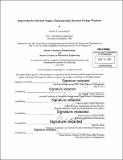Improving the inbound supply chain through dynamic pickup windows
Author(s)
Cummings, Charles R., III (Charles Ronald)
DownloadFull printable version (10.59Mb)
Other Contributors
Leaders for Global Operations Program.
Advisor
Itai Ashlagi and Chris Caplice.
Terms of use
Metadata
Show full item recordAbstract
Amazon is one of the world's largest retailers with revenues of $74.5 billion in 2013 and 22% growth over 2012. As Amazon continues to grow and offer greater selection, more products are flowing through an expanding inbound network. While this growth has added complexity for the inbound transportation organization, it has also created opportunities to reduce transportation cost and improve performance. Inbound transportation managed by Amazon currently represents 60% of the company's inbound freight. For this freight, Amazon uses automated shipment-planning systems to select a carrier for all shipments. The systems run once per day, selecting carriers for a set of shipment requests where each vendor has specified a freight ready date of tomorrow. Several inputs are included to achieve a low transportation cost for the network, but the systems are constrained by the vendor's freight ready date. By introducing dynamic pickup windows based on when the freight is needed in the fulfillment centers (FCs), Amazon has the opportunity to reduce transportation cost and mitigate out-of-stock occurrences. A current state analysis revealed that approximately 70% of Amazon's freight was shipped through expensive less-than-truckload and small-parcel methods. While truckload shipments are ideal in transportation, ordering smaller lots more frequently is preferable to maintain high in-stock levels in the FCs while keeping inventory holding costs low. Therefore, Amazon's shipment-planning systems minimize transportation cost by building multi-stop routes to pick up smaller shipments from several vendors before delivering to the FC. The dynamic pickup window solution changes the planning process by relaxing the constraint of tendering a shipment today to a high cost transportation mode if that freight does not need to ship today. If shipment requests are not tendered today and instead sent to tomorrow's pool of requests, two types of consolidation can occur: (1) a single-vendor consolidation and (2) a multi-vendor consolidation. A model was developed to simulate shipment planning on the entire network for one week, resulting in a 2% transportation cost reduction and 4% fewer shipments while protecting in-stock levels. Amazon piloted in late 2013 with success and plans to implement throughout the network in early 2014. While the dynamic pickup window solution is presented with Amazon as the case study, the solution is applicable to any business with stochastic demand and lead time, a large vendor base, and control of managing its inbound transportation.
Description
Thesis: M.B.A., Massachusetts Institute of Technology, Sloan School of Management, 2014. In conjunction with the Leaders for Global Operations Program at MIT. Thesis: S.M., Massachusetts Institute of Technology, Department of Mechanical Engineering, 2014. In conjunction with the Leaders for Global Operations Program at MIT. Cataloged from PDF version of thesis. Includes bibliographical references (page 72).
Date issued
2014Department
Leaders for Global Operations Program at MIT; Massachusetts Institute of Technology. Department of Mechanical Engineering; Sloan School of ManagementPublisher
Massachusetts Institute of Technology
Keywords
Sloan School of Management., Mechanical Engineering., Leaders for Global Operations Program.